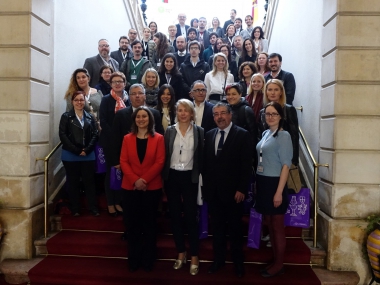COIMBRA – CITY OF NUMEROUS SKILLS
Edited on
12 January 2018The city of knowledge, the city of students and the city with the oldest university of Portugal is how Coimbra has been known for several years.

However, the city has many other skills that have started to gain ground and that place it in the front line in different areas, like health or sciences and technologies, for example, areas that are internationally recognised. These cases are obviously related to the system of higher education of the city, in which the role of the University of Coimbra, of the Polytechnic of Coimbra and of the Pedro Nunes Institute is unquestionable in what concerns its growth, development and promotion.
Also unquestionable is the boost to Coimbra brought by the Convento São Francisco, placing the city as a MICE (Meetings, Incentives, Conferences and Exhibitions) destination and putting it on the route of big events, allowing the growth of these important sectors which contribute to our economic development. The opening to the public of this structure has created a new dynamic in the city with notorious changes at different levels, namely in what concerns urban rehabilitation and an increase in the demand for business opportunities by investors, some of them young entrepreneurs, that propose to give answer to the needs of residents, as well as of tourists and visitors, each time more demanding, requiring the implementation of a quality offer.
These changes are not happening only in the surroundings of the Convento São Francisco, they are also present in several other places of the city, with a strong policy of the Municipality for the Historical Centre, part of it integrated in the area classified by the UNESCO as World Heritage. For this purpose are being defined policies for urban, economic, social and cultural rehabilitation, that aim to promote the attraction and settlement mainly of young people, the so called generation Y or Millennials, gathering the history and culture of the city with innovation, creativity and young entrepreneurship. The result is clear with the increasing demand of young people for the Historical Centre, to live, as well as to implement new business ideas, revitalizing this part of the city.
The transnational meeting of the programme URBACT III | GEN-Y City, that took place in Coimbra on the 30th and 31st of March 2017, showed to the project partners the transformation the city is living, that reflects the work that is being developed by the Municipality in conjunction with the city’s stakeholders, because we believe that only with joint work will be possible a sustained evolution.
We would like to highlight the presentation of the project ”Há Baixa”, from the students of the Department of Architecture of the Faculty of Sciences and Technologies of the University of Coimbra. This project has as main goal to carry out small rehabilitation works, in the area of “Baixa” (Downtown), in houses and commercial spaces. The students showed how it is possible to develop innovative projects, in urban and social rehabilitation without financial resources. To implement their project they ask the support of several profit and non-profit organizations, which contributed with their own resources. During the works the students get involved with the local community, strengthening the relation between the University and the city, at the same time as they are putting into practice the knowledges acquired during their studies.
This project reflects the will of young people to actively participate in the development of the city, in a way of helping to create conditions to stay here after finishing their studies, as it is possible to confirm through the results of the study developed by the students of the Master of Sociology of the Faculty of Economics of the University of Coimbra that are carrying out a traineeship in the Municipality of Coimbra. This study under the theme “The challenges of Generation Y in the City of Coimbra” revealed that only 15% of the respondents showed interest in leaving the country to work and only 30% of the respondents showed interest in leaving the city. Family was also considered as a major factor in the establishment and retention of young people in the city.
Due to the specific characteristics of Coimbra, as well as to its numerous skills and various players, it is now important to think the city regarding a future that follows the world trends in what concerns sustainability, citizenship and social responsibility and also to find solutions that allows an harmonious coexistence between our cultural heritage and innovation, creativity and entrepreneurship, capable of retaining and attracting young people that continue our History.
 Submitted by Karolina Prymas on
Submitted by Karolina Prymas on
